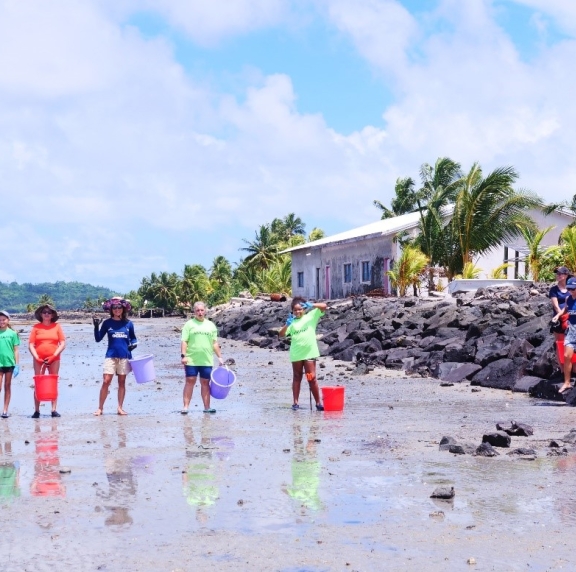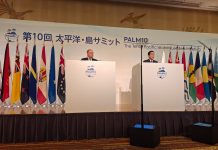The International Coastal Clean-up Day (ICCD) in 2023 witnessed a wave of impactful initiatives across the Pacific Islands. From community-driven clean-ups to educational programs, these activities underscored the region’s commitment to combating marine pollution and fostering environmental awareness.
Every year, the International Coastal Clean-up Day serves as a rallying call for communities worldwide to join forces in the battle against marine litter. The 37th edition of this global event, held on the 23th of September 2023, witnessed an extraordinary collaboration between the Secretariat of the Pacific Regional Environment Programme (SPREP), through three instrumental funding sources; the Committing to Sustainable Waste Actions in the Pacific (SWAP) Project funded by the French Development Agency (AFD), the Pacific Ocean Litter Project (POLP) funded by the Australian Government, Implementing Sustainable Low and Non-Chemical Development in SIDS (ISLANDS) Project funded by the Global Environment Facility and several other key partners.
To enhance the effectiveness of the clean-up activities, Sustainable Coastlines, a New Zealand charity, conduct virtual training sessions for all participating organisations each year. The training, spanning two hours, covered safe beach clean-up procedures and statistical waste survey and audit methodologies. Beyond the immediate clean-up, the legacy of this day lies in the data collected, the awareness raised, and the behavioural change inspired. To learn more about the date on Marine Litter in the Pacific Region, please visit the Litter Intelligence Application developed by the charity: https://litterintelligence.org/.
Moata’a Village in Samoa marked the initiation of the International Coastal Cleanup Day for 2023, engaging 200 dedicated volunteers. The participants divided into two groups, with one focusing on the primary cleanup of the river and various sections within Moata’a village. Simultaneously, the second group conducted a waste audit from a designated survey area, which was later sorted to identify the types of waste collected — whether plastic toys, food wrappers, aluminium cans, construction materials, sanitary items, or others. Notably, the audit revealed the collection of nine diapers from the beach, which can pose a health problem not only for the environment, but above all for beach users.
According to Lenatai Victor Taumapua, a Member of the Moataa Village and the Constituency’s Member of Parliament, “It is our duty to safeguard our environment, not just for our present generation but for the prosperity of generations to come. This holds immense significance for us in the Pacific, where our dependence on our oceans is crucial. Ensuring the protection of marine life is our responsibility; by taking care of the marine ecosystem, it, in turn, will take care of us.”
The Samoa Conservation Society amongst associations involved applauds and urges everyone to be part of this action because despite Samoa being one of the smallest nations with minimal contributions to the plastic pollution problem, even the smallest efforts matter. This serves as a reminder to all to act, starting with managing waste from our homes as a substantial 99 percent of the collected waste is derived from land-based sources, predominantly households. Activities conducted as part of the ICCD2023 highlighted the importance of addressing the source of the problem through awareness, strategic waste management, and environmental responsibility.
As such, Aliimuamua Setoa Ava, the Principal Officer of the Solid Waste Management and Pollution Control Division at the Ministry of Natural Resources and Environment, Samoa, emphasises, “Waste management is a collective responsibility.” Encouraging everyone to actively participate, he advocates for adopting the 4 R concept: reduce, reuse, recycle, and return. Emphasising the importance of citizen involvement, he urges everyone to contribute to minimising waste in Samoa and within the Pacific region, highlighting that “plastic pollution is the second-largest issue emerging now, next to climate change.”
ICCD2023 activities also showcased effective community engagement, strategic waste management, and a commitment to environmental responsibility. Messages from the Suva, Fiji team of the Pacific Ocean Youth Litter Project (POLYP) emphasise the need to reclaim responsibility for our waste. They strongly advise against littering on the beach, as it tarnishes the pristine beauty of Pacific island coastlines. Among the primary plastics discovered in the Suva cleanup area were plastic bottles, single-use plastics, and food wrappers.
To outline the purpose of reinforcing the importance of mindful waste management, volunteers transformed some of the collected trash into art, demonstrating creativity and awareness. this Artivism acknowledges the detrimental impact of plastic pollution on our marine environment, which is critical for Pacific islanders. Plastic ingestion by our fish and seafood is a growing concern, signifying its entry into the food chain we rely on.
The stories of individuals coming together across borders, of communities standing united for a common cause, echo the fundamental truth – the health of our oceans is a shared responsibility that transcends boundaries.
This is why the international community is negotiating a legally binding agreement on plastic pollution: In February 2022, at the resumed fifth session of the United Nations Environment Assembly, a historic resolution was adopted to develop an international legally binding instrument on plastic pollution, including in the marine environment. The Intergovernmental Negotiating Committee (INC) was established, beginning its work in the second half of 2022 with the ambition of completing its work by the end of 2024. The next INC is scheduled from 23 to 29 April 2024 at the Shaw Center in Ottawa, Canada.
Fourteen Pacific countries are advocating for the priorities of their communities at these INC’s and the successes of ICCD 2023 serve as reminder that continued action is needed at home. The movement for ocean health is a dynamic force, and with each cleanup, each piece of data collected, we move one step closer to a world where our oceans thrive, teeming with life, and free from the burden of marine litter.
As the world continues to grapple with the escalating threat of plastic pollution, the efforts of organisations like SPREP through the SWAP, POLP, ISLANDS projects and their dedicated partners serve as a beacon of hope. The International Coastal Cleanup Day 2023 not only cleaned up shores but also paved the way for a more sustainable and resilient future for our oceans and the communities that depend on them.


















